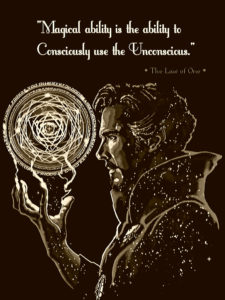Lacunae — blind spots —
like black cats prowling midnight,
but just out of sight.
Napa Street, Berkeley, Summer 1977: In Christine’s room, Richard W. and I were yakking about nothing in the late morning. The windows were open; the day would be warm. A fat fly buzzed lazily around Richard where he lounged on the floor beneath the window.
Our talk turned to magic and miracles. He’d seen some; I’d seen some. I was relating a strange experience in England. How magic can happen in an instant, with no sense of effort, and as though something else is acting through you. I’d felt it before. It feels natural, more natural than most days’ living; it’s hard to describe.
“It was as if, suddenly, there’s a kind of a wave, and you’re being carried along. You’re caught up,” I said, trying to capture it.

He looked dubious.
“It’s like this,” I said. I pointed to the fly. “Suppose I said to that fly, ‘Come here.’”
The fly flew across the room, and landed on my finger.
“And then suppose I said, ‘Fly out the window.’”
The fly took off, flew past Richard and out the window.
Richard gaped. I nodded. It had come; it had gone. I felt no sense of triumph, or strength; it wasn’t exactly me that did it. It felt … right. At the time, it seemed inevitable.
Is this something that’s always in us, waiting to emerge? Or does it pass through humanity like a wind through the boughs? Why does it appear seemingly only at great need, or, like today, in no need at all? Is it a matter of attention, or, like conscious dreaming, a matter of exactly the right amount of inattention? What is it?
These things — miracles, epiphanies, synchronicities — surround us, like nebulae of faeries, visable and hiding in plain sight. Magic breathes into and out of our world, transient lacunae, trailing thin and smoky tracks like cosmic rays in this cloud chamber we call Earth. A blink of the mind; they are gone.

 The ‘Non-Conscious’ mind can regulate your body in a thousand ways (all normally below your consciousness), and the ‘Non-Conscious’ mind can automatically serve up learned actions like a tennis-serve or automatically serve up your opinion of the President or automatically make you feel anxious on a date. Some of this is swell, and some of this is occasionally awful, but the Non-Conscious mind is looking out for you as best it can, and everything it does is automatic.
The ‘Non-Conscious’ mind can regulate your body in a thousand ways (all normally below your consciousness), and the ‘Non-Conscious’ mind can automatically serve up learned actions like a tennis-serve or automatically serve up your opinion of the President or automatically make you feel anxious on a date. Some of this is swell, and some of this is occasionally awful, but the Non-Conscious mind is looking out for you as best it can, and everything it does is automatic.
